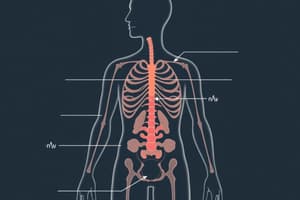Podcast
Questions and Answers
The endocrine system helps the body communicate through the use of chemical signals called _________.
The endocrine system helps the body communicate through the use of chemical signals called _________.
hormones
Hormones help maintain homeostasis through ____________ ___.
Hormones help maintain homeostasis through ____________ ___.
feedback loops
A hormone ___________ can lead to disease or dysfunction.
A hormone ___________ can lead to disease or dysfunction.
imbalance
What is a hormone secreted by?
What is a hormone secreted by?
There are ______ and _______ hormones.
There are ______ and _______ hormones.
Is your body's response to sugar intake an example of positive or negative feedback? Explain your reasoning.
Is your body's response to sugar intake an example of positive or negative feedback? Explain your reasoning.
Describe two problems in the loop you have created that can produce an imbalance of sugar in the blood and lead to diabetes.
Describe two problems in the loop you have created that can produce an imbalance of sugar in the blood and lead to diabetes.
How are neurotransmitters and hormones similar and how are they different?
How are neurotransmitters and hormones similar and how are they different?
A target cell has to have a ________ to pick up hormones.
A target cell has to have a ________ to pick up hormones.
Describe two ways in which communication in the endocrine system and in the nervous system are different and one way in which they are similar.
Describe two ways in which communication in the endocrine system and in the nervous system are different and one way in which they are similar.
How do you think the endocrine system and the nervous system work together to control communication in the body?
How do you think the endocrine system and the nervous system work together to control communication in the body?
What is the main difference between an endocrine gland and an exocrine gland? Provide an example of each type of gland and discuss what this gland secretes.
What is the main difference between an endocrine gland and an exocrine gland? Provide an example of each type of gland and discuss what this gland secretes.
Endocrine glands release where?
Endocrine glands release where?
Exocrine glands release where?
Exocrine glands release where?
Too much insulin causes....
Too much insulin causes....
Too much growth hormone causes.......
Too much growth hormone causes.......
Too much T3/T4 causes....
Too much T3/T4 causes....
Too little T3/T4 causes...
Too little T3/T4 causes...
What are some factors that affect endocrine organs?
What are some factors that affect endocrine organs?
When there is too little of a hormone, the body does what?
When there is too little of a hormone, the body does what?
When there are too many hormones, the body does what?
When there are too many hormones, the body does what?
___________ glands are a type of merocrine glands and secrete saliva.
___________ glands are a type of merocrine glands and secrete saliva.
____________ glands secrete oil on the skin.
____________ glands secrete oil on the skin.
Exocrine glands have _______.
Exocrine glands have _______.
Give some examples of endocrine glands.
Give some examples of endocrine glands.
Most endocrine glands are controlled by __________ and ____.
Most endocrine glands are controlled by __________ and ____.
Flashcards are hidden until you start studying
Study Notes
Endocrine System Overview
- The endocrine system communicates through hormones, which are chemical signals.
- Hormones maintain homeostasis via feedback loops, primarily through negative feedback mechanisms.
Hormone Imbalance
- An imbalance in hormone levels can lead to diseases or dysfunctions.
- Two major types of hormones are categorized as short-term and long-term hormones.
Blood Sugar Regulation
- High sugar intake elicits a negative feedback response, aiming to restore normal blood glucose levels.
- Problems leading to blood sugar imbalances and diabetes include improper insulin production and excessive insulin secretion.
Neurotransmitters vs. Hormones
- Both neurotransmitters and hormones utilize receptors for signal transmission but differ in their modes of communication—neurotransmitters use electrical charges and hormones rely on chemical triggers.
Communication Systems
- The endocrine system communicates through hormones in the bloodstream, while the nervous system relies on electrical signals. Both systems collaborate to maintain homeostasis.
Gland Types
- Endocrine glands (e.g., pituitary gland) release hormones directly into the bloodstream; exocrine glands (e.g., sweat glands) secrete substances onto epithelial surfaces.
- Exocrine glands utilize ducts for secretion.
Hormonal Effects
- Excess insulin can lead to diabetes; excess growth hormone results in acromegaly; excessive T3/T4 leads to hyperthyroidism, while a deficiency in T3/T4 causes hypothyroidism.
Factors Affecting Endocrine Function
- Factors such as aging, diseases, stress, environment, and genetics can impact the performance of endocrine organs.
Feedback Mechanisms
- The body increases hormone production when levels are too low and decreases it when levels are excessively high.
Gland Examples
- Endocrine glands include pancreas, thymus, thyroid, pituitary gland, pineal gland, adrenal gland, ovaries, and testes.
- Salivary glands and sebaceous glands are examples of exocrine glands. Salivary glands secrete saliva, while sebaceous glands produce oil for the skin.
Additional Note
- Most endocrine glands are regulated by feedback and other control mechanisms.
Studying That Suits You
Use AI to generate personalized quizzes and flashcards to suit your learning preferences.




